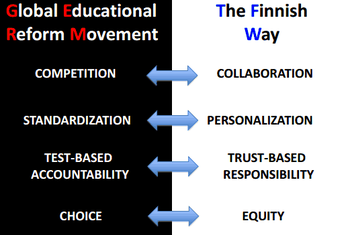Public education is failing. We must privatise, test, incentivise, union-bust, cut and fire the way to success.
But, while the PISA results might provide a simplified gradation of countries' academic performance, they are not comparing apples with apples and there are some important variations that need to be considered. The film goes on to show some of the factors that really matter when looking at student achievement and how, far from the message being fed to the public (falling student performance, poor quality teachers who are overpaid and underworked, poor value for money, obstructive teacher unions), what is needed is a closer look at the lessons coming out these results and the surrounding research.
Rather than looking at the rankings as a simple measure of the U.S or U.K.'s performance, we need to look at the lessons that can be learnt from the highest performing countries. When you look more closely at those countries, you will see they have very different priorities from those being pushed in the US (and the UK), such as early education, funding equity, collaboration, teacher support, community partnerships, high student expectations.
So what is needed to improve U.S. (and U.K.) schools? A couple of lessons stand out:
Public spending in the right place. PISA research makes clear that poverty's effect on educational equity matters - higher child poverty rates result in poorer student learning outcomes. so systems need to do more to provide equal access to quality educational materials for students from poorer socio-economic backgrounds.
Teacher support - number of hours spent teaching in the classroom are far greater. More time out of the classroom is need to allow teachers to collaborate, prepare lessons, grade papers and talk to parents, all of which helps student performance. All teachers need to be well-prepared and supported throughout their careers
The film concludes that rather than wringing our hands about the PISA results and doing the wrong things, we need to concentrate on learning lessons from the top-performing countries and concentrate on doing the right things for the students we have.
- Investing in ECE.
- Targeting resources to the kids who need it most
- Giving teachers time to prepare lessons and collaborate
- Proper implementation of a robust curriculum
- Using assessment that helps teachers in meeting students needs.
- Treating teachers as professionals
- Involving community
- Collaborating with Unions
- enhancing equity - gender equity and economic equity
- investing and acting early
- collaboration not competition
- preparing schools for children not preparing children for schools (child-friendly schooling that understand and meets the needs of children rather than success depending on whether the child can fit into school (a point strongly made by Ken Robinson in his books Out of Our Minds; and The Element: a new view of human capacity).
Let's hope our politicians can start to work with our teachers and schools and work out how to apply these lessons. Sadly, many of the policies emerging in the U.K. seem to be doing the exact opposite at the moment. It is hard to see why this is the case when there is so much research pointing to what is actually needed.

 RSS Feed
RSS Feed
